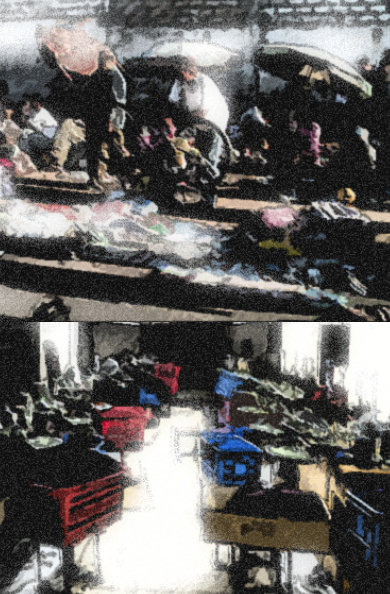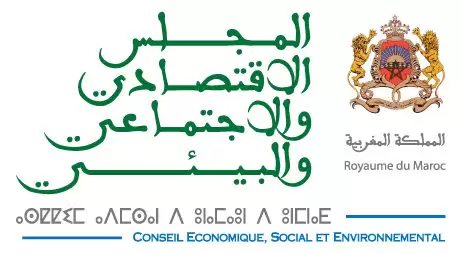
ASA-C1-052020-54-7080
In its broadest acceptance, the informal economy (IE) continues to be a highly pervasive and intricate phenomenon, accounting for up to 30% of GDP according to the latest statistics from Bank Al-Maghrib (2018). National and international institutions estimate that between 60% and 80% of the working population in Morocco is engaged in informal activity.
In this opinion, the CESE confirms that the IE is plural in its widest understanding – encompassing many categories. It should be pointed out, however, that it is the “non-informal subsistence” sector that poses the real threat to our country, such as smuggling, the underground activities of “forma” businesses (such as under-declaration of sales or employees), as well as the “competitive” informal sector, in which operators deliberately evade their obligations even though they have the resources and the structures needed to fulfil them.
In its broadest acceptance, the informal economy (IE) continues to be a highly pervasive and intricate phenomenon, accounting for up to 30% of GDP according to the latest statistics from Bank Al-Maghrib (2018). National and international institutions estimate that between 60% and 80% of the working population in Morocco is engaged in informal activity.
In this opinion, the CESE confirms that the IE is plural in its widest understanding – encompassing many categories. It should be pointed out, however, that it is the “non-informal subsistence” sector that poses the real threat to our country, such as smuggling, the underground activities of “forma” businesses (such as under-declaration of sales or employees), as well as the “competitive” informal sector, in which operators deliberately evade their obligations even though they have the resources and the structures needed to fulfil them.
The finding is that the great many public programs that have been launched to integrate the informal economy into the formal sector have had no significant impact on the likelihood of informality being reduced.
A variety of reasons can account for the persistence of informality in Morocco, including: (1) the inadequate level of qualifications, which excludes many workers from the formal economy, (2) the lack of employment opportunities in rural areas, (3) the representation of the informal economy operators, such as by organizing workers in the informal economy into trade unions, which takes away from IE modernization and formalization endeavors, (4) the weak inclusive nature of the social protection system and the policy of less State involvement in certain social public services, which lead informal economy operators to question the value of migrating to the formal status, (5) the persistence of regulatory obstacles to the formalization of the informal economy, (6) difficulties in accessing finance, markets and suitable land, as well as adequate non-financial support and guidance towards formalization, but also (7) the limited effectiveness of the law and the influence of corruption, among other reasons.
Informality certainly enables vast swathes of the population to subsist and escape unemployment, but at the same time it causes job insecurity, generates unfair competition with the formal economy and adversely impacts the national economy, with a significant loss in tax revenues for the State.
As a matter of fact, in the absence of impactful alternatives, the country adopts a more tolerant approach to informality – on grounds of a fragile social peace though and to the detriment of the rule of law. If necessary and urgent measures are not taken, the Council underlines, informality may be a serious source of instability in its social, economic and security dimensions.
Given the serious nature of the issue, the Council calls for an integrated strategy to reduce the size of the informal sector in Morocco.
This strategy ought to reduce the share of informal employment in total employment gradually to some 20%, a level close to that of developed countries. The 20% target would mainly concern subsistence activities and informal limited-capacity production units. On the other hand, a zero-tolerance target is set for illicit, underground and competitive informal sector activities.
Here is a list of key measures proposed by the Council:
- Ensure that regulatory and administrative barriers to informality are removed. This necessarily requires a complete updating of existing regulatory requirements that hinder formalization (for example, enhancing the attractiveness of the auto-entrepreneur status such as by allowing auto-entrepreneurs to hire 2 to 3 staff and extending their transaction threshold).
- Draw up a multi-year program for the organization of business lines and frames of reference or specifications which define the skills and qualifications required for each profession, to modernize these professions and facilitate their formalization.
- Create economic activity zones that offer well-equipped rental spaces, with various rental and surface area options that align with the needs of micro-businesses.
- Adapt, diversify and facilitate access to means of financing, particularly by extending the list of objectives targeted by the Mohammed VI Fund for Investment to include the financing of the process of the integration of the informal into the formal economy and by offering favorable financing terms to young people and women wishing to move to the formal economy.
- Strengthen the range of advisory and support services, by providing tailored guidance to informal entrepreneurs on how to transition to the formal sector and guaranteeing end-to-end (e2e) solutions to entrepreneurs who want to convert to a limited liability company.
- Set up a co-contracting exchange to encourage joint bids by auto-entrepreneurs and micro-businesses for public contracts. The objective is also to help distinguish, as far as public procurement is concerned, between the minimum proportion of government contracts that are awarded to auto-entrepreneurs and cooperatives and those allocated to SMEs.
- Strengthen controls and inspections at various levels (labor inspectorate, CNSS, technical compliance checks, etc.) and ensure that the level of penalties is sufficiently dissuasive and proportionate to the seriousness of the offence (particularly the informal sector and the underground practices of formal businesses).
- Establish a monitoring and delivery unit (MDU) for effective implementation of the integrated national strategy to reduce informality.
